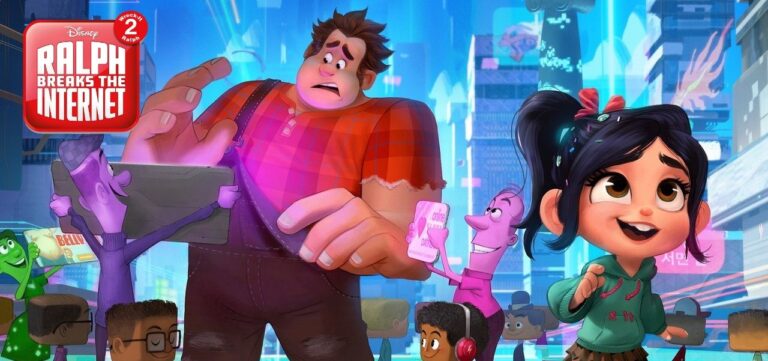Video games have a come a long way since the days of coin arcades and sitting on the couch with your best friends and sharing controllers. These days all roads lead to the internet for gaming – just look at the phenomenon of Fortnite or any other of the other massively popular current racing or shooter games. So it makes perfect sense that the highly anticipated follow-up to the enjoyable animated film Wreck-It Ralph is appropriately titled Ralph Breaks the Internet, and sees its heroes venturing out into the immense world of the net.
John C. Reilly reprises his role as the fictional classic video game villain and lovable doof Ralph, alongside Sarah Silverman’s return as Ralph’s best friend – the sassy/sweet racer Vanellope. Life has been simple and easy since their first big adventure and Ralph couldn’t be happier, while Vanellope, on the other hand, is starting to feel a little bored with their comfortable, repetitive daily life.
After Vanellope inadvertently causes the real-life steering wheel on her Sugar Rush arcade game to be irreversibly damaged, the petite racer and her in-game inhabitants find themselves homeless. Since Sugar Rush is no longer in production, Ralph and Vanellope must travel through their arcade’s newly installed internet to find the rare replacement wheel. If it’s not delivered to their arcade within the week, Vanellope’s game will be scrapped for spare parts.
Ralph Breaks the Internet is successful in capturing most of the elements that made the original a solid hit for audiences – lots of character cameos, witty genre in-jokes, and a heaping of heart from its main characters. The film is not successful in wrangling the wealth of opportunities that the internet setting provides for potential characters and stories. Certain sections in the film feel like an extended ad for Disney properties or just the highest bidders that wanted their company name in the movie.
O’Reilly and Silverman’s chemistry really carries the weight of the story though, and their relationship is the most nuanced and complicated plot element of either film. Surprisingly Ralph Breaks the Internet does not really have a main villain: the whole crux of film is refreshingly focused on their friendship and how it has to evolve so they can both be happy. This decision to drop a true blue villain in favor of character development gives more time to explore the worlds and focus on Ralph and Vanellope, rather than spending precious screen time on origins and motivations of a bad guy threat.
Not that Ralph Breaks the Internet doesn’t add characters to its main cast. Gal Gadot joins as infamous racer Shank from the violent game Slaughter Race, and Taraji P. Henson is Yesss, an algorithm mogul in charge of fictional trending video site BuzzTube. Gadot stands out the most and is quite endearing as a pseudo-mentor for Vanellope, but both actresses do nice work in very limited screen time.
As mentioned earlier, one of the bigger downfalls of the film is one of its greatest assets – all the different properties Ralph Breaks the Internet was allowed to play with in the movie. The introduction of the internet world felt like a five-minute long commercial for every major app, online shopping service or social media site out there crammed over way too much visuals for the brain to process.
After sitting through that extremely egregious, self-indulgent sequence I was ready to tag this movie as a weak cash grab. Luckily the film won me back with some much more clever uses of properties on a Disney fansite that had characters from Star Wars, Marvel, Pixar and some laugh out loud scenes with all of the Disney princesses, most voiced by their original actresses.
Ralph Breaks the Internet earns its place alongside the first film with plenty of genuine laughs and incredible visuals all situated in multiple levels of nostalgia. Yet the film just isn’t as clever or unique as the first outing, but fans of the first will still highly enjoy logging in for another adventure with these characters in this follow-up.




